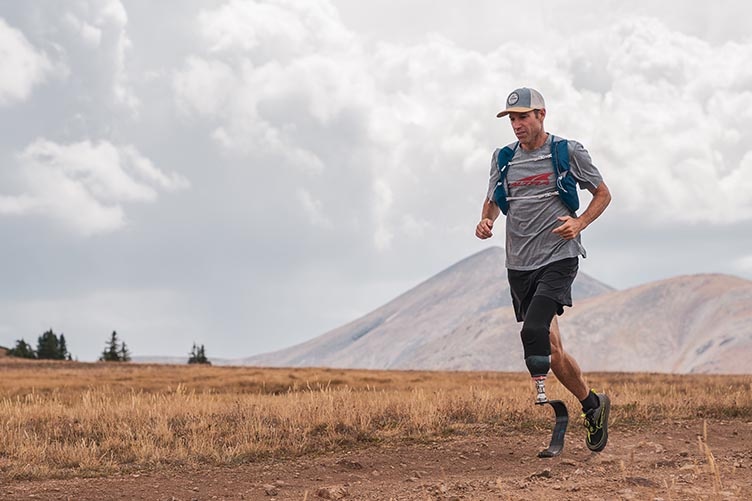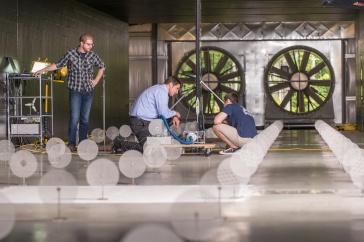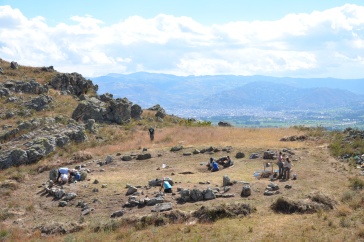
When it came to athletic pursuits, the great outdoors didn't immediately beckon to Dave Mackey ’92. He grew up active in Cumberland, Maine, and loved fishing and hunting. But in the sporting arena, he concentrated on traditional “ball and stick” pastimes. After transferring to UNH as a second-semester sophomore, Mackey played soccer for a season, but soon found himself being drawn to wilderness pursuits.
That transition coincided with Mackey switching his major from biology to outdoor education and joining Fireside Experience, a club affiliated with the outdoor ed department. There, he met his future wife, Ellen “Ellie” Bilek ’92, and helped organize a number of outings that included an urban mountain bike excursion to Boston. He also found the sport that would define him.
“I really discovered trail running at UNH, out in College Woods, to stay in shape for soccer,” Mackey says. “We also did orienteering out there, as part of the outdoor ed program. We'd bash around College Woods all the time, and I got to know that place really well.”
After leaving Durham, Mackey earned his physician assistant degree and pursued his love of outdoor competition, becoming a sponsored athlete and runner representing several outdoor brands. He and Ellen married, settled into the endorphin capital of Boulder, Colorado, and had two children — Ava, now 12, and Connor, 10. Mackey quickly immersed himself in Boulder's vibrant running scene.
Longtime friend and Boulder journalist Brian Metzler says Mackey initially struck him as stoic and serious; devoted to his running and adventure racing to the point of seeming aloof. “He's very committed to the things he cares about — his family, his career, his training, his racing, his friends,” Metzler says. “He's unwavering in his approach, something I respect immensely.”
Indeed, by the early 2000s Mackey had solidified a reputation for toughness and perseverance well beyond the Boulder running community. A decorated off-road runner and adventure racer, his specialty was ultra-distance events, mind-bending contests lasting between five and 10 hours or longer, covering distances of 50-100 miles or more and often including lung-busting, thigh-burning climbs and descents measured in thousands of feet. The winner of events including Utah’s Wasatch 24-Hour Adventure Race, Virginia’s Mountain Masochist 50-Mile Trail Race, the Mountain Mist 50K Trail Race in Alabama and the Firetrails 50 Trail Race in California, Mackey collected USA Track and Field Ultrarunner of the Year awards in 2004 and 2005, and was named Ultrarunning Magazine's 2011 North American Runner of the Year.
Those achievements and accolades didn’t surprise those who had known Mackey at UNH. Matthew O'Connor ’92, a one-time housemate and climbing partner, recalls, “One of the most compelling things about Dave was his uncanny ability to roll with things. Not to say he wasn't fiercely competitive in his own way, or that he couldn't have the bad days that we all do.” But many of the things that bothered most people, O'Connor says, didn't bother Mackey — a quality that contributed to his success as an endurance athlete. “Those events are long and brutal, and they often don't go well. But Dave could simply take that for much longer than most people.”
It was that very quality that Mackey would need to tap into when his life underwent a seismic shift on May 23, 2015, the day that launched a journey that would test his ironclad resolve.
Dodging a Bullet
On a cloudy morning, he headed out for a typical three-hour training jaunt through the Boulder hills. After chatting briefly with a friend, Paul Gross, on South Boulder Peak, Mackey continued to Bear Peak. He came across a familiar boulder lodged in the soil, a large rock that he had used as a stepping-stone countless times before. That day, however, followed a stretch of stormy weather, and as he pushed off, the boulder broke free from the wet soil. Mackey tumbled uncontrollably some 60 feet down the side of Bear Peak, counting himself lucky to land on his back among some scree. But the giant boulder that had given way underneath him rumbled down the hillside in his wake, smashing into his left leg and pinning him down.
Gross heard Mackey's cries and rushed to his aid, levering the 300-pound boulder off his shattered leg. Amid lashing rains and lightning, a rescue crew lowered Mackey 600 feet off the peak and rushed him to Boulder Community Hospital with an open tibial fracture. The subsequent surgery was complicated, but after treating a contaminated fracture and setting the leg, Mackey's doctor expressed optimism.
“I remember clearly — there's a video clip from a local news station — on the night of the accident, the surgeon was saying ‘Dave's expected to make a full recovery,’” says Mackey. “And that was my perspective.”
Mackey thought he had dodged a bullet, having survived the potentially fatal fall and avoiding serious internal or brain injuries. But then infection, likely caused by the soil mixing with the open wound on his leg, set in. It was a devastating development. Over the next 18 months, Mackey endured 12 operations, but nothing worked. The infection persisted. Internal scarring and failing hardware left him in near-constant pain. Worst of all, the damaged limb robbed Mackey of the spontaneity that defined him, says his wife.
“He's not your typical regimented athlete at all,” Ellen Mackey says. “He's kind of a wilderness athlete. He gets out, he does it, and if he feels good, he keeps going. He was always like that.”
After the accident, however, it was no longer possible to “keep going.” It was a challenge unlike any Mackey had faced before, one he couldn’t prevail over through sheer hard work and willpower. Finally, in late 2016, he scheduled one more surgery — this time, to amputate his damaged leg.
“Given the fact that there was no healing going on, and after discussing it with professionals and other amputees, we thought amputation was the best choice,” says Mackey, now 50. “I knew if I didn't lose it, I'd be dealing with a very dysfunctional, painful leg for the rest of my life. I could have tried other surgeries that had a low likelihood of success, but I would have been sacrificing years of my life to try things that probably weren't going to work.” It was the right answer, he says, but “it was hard, for sure.”
Ellen Mackey calls the below-the-knee amputation a mixed blessing. It meant that her husband's life would change irrevocably, but it also meant he now had a chance for a new start. “It was a reset,” she says. Not long after the surgery, “He said, 'Oh my god, I can move again. I don't hurt.’ He was biking like crazy. It was like having freedom again.”
Second Act
That freedom fueled a second act, and a renewed passion for multi-sport racing. Longtime friend Travis Macy, a Colorado-based author and adventure racing teammate, says Mackey's decision to sacrifice his left leg “generated a sense of finality.” Both men knew that a return to “running would be tough, but I had no doubt Dave would handle it with grace,” says Macy. “Some of us who are into endurance sports do better when we've got a huge challenge ahead. The amputation defined a clear path and allowed Dave to focus in and go for it.”
Mackey employed his trademark grit to his rehabilitation and recovery, particularly when progress didn’t come as quickly as he had anticipated. “I thought I'd be walking two weeks after the amputation, but it took six weeks,” he says. “Eventually, about two and half months after the amputation, I actually hiked up to the top of Bear Peak again. That was a pretty big moment.”
Four or so months after the amputation, Mackey completed a five-mile run, fitted with a high-tech running blade. It was a challenge, but after that, he says, “I knew I wanted to go back and complete some of the races that, in the past, had been benchmarks.”
In summer 2018, 20 months post-amputation, he completed Colorado's grueling Leadman series, which includes a mountain marathon, a 50-mile mountain bike/trail run, a 100-mile mountain bike race, a 10-kilometer trail run and a 100-mile trail run. The series translates to more than 284 miles of endurance racing on mountainous terrain. The year before his accident, Mackey had finished second overall. In 2018, he was the last competitor to beat the coveted 25-hour cutoff for the final event, the 100-mile run, completing the series in 12th place out of 99 competitors and becoming the first leg amputee to finish the Leadman series.
That result revealed a new reality: today, Mackey no longer races to win, but to simply participate. He is still remarkably fit — a lean, sinewy 165 pounds filling out his 6-foot, 1-inch frame — despite having lost his elite speed.
“I'm mostly competing against myself,” he says. “I'm just doing my own thing. It was very different before, when I was trying to be top three or better. So it was a very different experience than what it is now. They're not races for me anymore. They're adventures.”
They’re also a source of inspiration for those around him. “People tell me that pretty often, particularly during races,” Mackey says. “People will say something to me, as I'm passing them or they're passing me. It happens all the time, and I'm really honored about that.”
Perspective
As a physician assistant, he also brings the perspective of an emergency medicine professional who has seen far worse patient outcomes. He knows people who have lost limbs, some of whom are never the same again. He says the ones who do well are the ones who are motivated. “You have to want to get better,” he says, “but anyone can change their life, at any time. It's a matter of choice.”
That belief, says Ellen Mackey, is an extension of her husband's unrelenting positive outlook, and his ability to see the proverbial glass half-full.
“Dave looks at life — and I'm very much built this way as well — like ‘we do the best with what we have.’ It's definitely been inspiring just to be around him and see him get back to his full-force mode,” she says. “He looks at it as a challenge instead of a hindrance. You just have to get up and go do it. You have to be present, and take it a day at a time, because it's a process. But it's also not magic. It's a lot of effort.”
In short, Mackey's mindset hasn't changed, even if his body has.
In addition to his athletic pursuits, professional responsibilities and family commitments, Mackey today works with the Range of Motion Project and Challenge Athletes Foundation, which provided invaluable assistance during his recovery. Last year, his race calendar again included the Leadman series as well as the Mount Evans Ascent — billed as the highest-elevation paved road race in North America, and an event he won in 2007. His 2020 schedule is still evolving, and he plans to again compete in the Leadman series.
“I've thought about doing fewer events, and more adventures. I've never climbed all the 14ers (Colorado’s 53 peaks of 14,000-plus feet),” he said. “Doing all those at once would be pretty cool. Or the (486-mile) Colorado Trail — I've always wanted to do that, start to finish, nonstop.”
While Mackey is often reluctant to discuss his accident and subsequent amputation, he says he feels very fortunate.
“I should have died from the fall. Anyone who has had a near-death experience is not the same,” he says. “I like to think I appreciate life more. Having been through all this, I learned a lot of good things. I'd rather have my leg back and be out there doing what I did before. Then again, I wouldn't have the same knowledge, or be the same person, if this didn't happen to me.”
-
Written By:
Brion O’Connor ’83 | Freelance Writer
















































